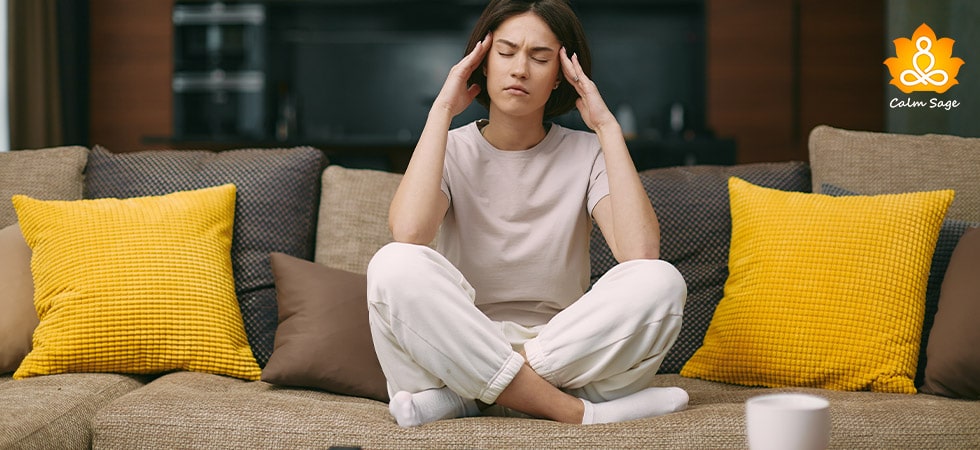Caffeine And Migraines: Can Caffeine Help Tension Headaches or Cause Them?

The relationship between caffeine and migraine is a complex one, with caffeine being an acute pain reliever as well as a potential trigger. Understanding the factors for caffeine-induced migraines can help you make informed choices about caffeine consumption.
Migraines are no joke; they are more than just severe headaches too. Migraines are like those uninvited guests who come with a drum set to play an enthusiastic solo right in your head. These severe headaches often come bearing nausea and sensitivity to light and sound. These unwelcome guests can wreak havoc on your health and day-to-day life, turning your simple tasks into never-ending challenges.
Now, I’m no stranger to migraines and I gather you’re not either. But what if I told you that the very cup of coffee that you rely on for a quick energy boost in the mornings and the afternoons might be the reason for your migraines?
Yes, caffeine – the one substance that you can count on for that energy boost and hyper-alertness – might be holding a secret.
So, caffeine enthusiasts and migraine sufferers, assemble! We’re taking a look to see if your morning cup of coffee or that caffeine-fueled soda might be triggering your headaches.
Key factors of Caffeine and Migraines :
- Migraines are a chronic neurological disorder that can cause severe pain, throbbing, nausea, and super sensitivity to light and sound.
- Caffeine might help with acute pain relief, but excessive consumption of caffeine can be a trigger for migraines.
- One study found that excessive caffeine consumption can trigger migraine headaches in people who are more susceptible to the disorder. Another study found that people who consume caffeine more are likely to experience chronic migraine headaches.
- Caffeine and migraines have a tricky relationship. While caffeine can be a relief for headaches in some cases, other times, it can be the one causing tension headaches.
What Are Migraine Attacks?

Migraines aren’t your simple tension headaches but are a chronic neurological disorder that can cause severe pain, throbbing, nausea, and super sensitivity to light and sound. Sounds painful, right? Now, imagine tackling your everyday tasks with a migraine headache. Yeah, doesn’t sound fun, does it?
Migraines can disrupt your life, making you miss work, alter your mood, and leave you feeling fatigued. If you suffer from migraines then you can imagine the pain they often come with. The pain can last from anywhere between a couple of hours to days! Clearly, migraines are no joke!
But, what exactly triggers migraine headaches? Some researchers believe that migraines can be caused by various factors, such as;
- Stress
- Changes in sleep patterns
- Dehydration
- Unbalanced diet
- Bright lights or sounds (if you’re sensory sensitive)
- Changes in weather patterns, and
- Hormonal imbalances
The Link Between Caffeine and Migraine…

Now for the fun part – what does caffeine have to do anything with migraines?
Various studies over the years have suggested that caffeine might play the part of a double-edged sword when it comes to tension headaches and migraines. In some instances, caffeine can help ease headaches, but in some cases, especially when excessive consumption of caffeine or caffeine withdrawal is concerned, your morning cup of Joe can be a trigger.
The interesting thing about caffeine is that you might find this drug in many migraine and headache medications. Caffeine has also been found to relieve acute pain in some cases.
Studies Say…
Researchers have been studying the relationship between caffeine and migraines. One study, in particular, found that excessive caffeine consumption can trigger migraine headaches in people who are more susceptible to the disorder. Another study found that people who consume caffeine more are likely to experience chronic migraine headaches.
However, it all depends on your constitutions too! Some people can chug cups after cups of caffeine and not feel any different from usual or any less sensitive to migraines!
In a 2019 small-scale study, it was found that people who were susceptible to migraine episodes, even a cup of a caffeinated beverage can increase their risk of migraine. In another review, it was found that caffeine withdrawal can also trigger migraines, but in another study where caffeine was used as a treatment option for severe migraines, it was found that caffeine can help relieve acute migraines.
So, can caffeine help tension headaches and migraines?
While more research is needed to understand if caffeine can help with migraines, it can be safe to assume that caffeine might help reduce some pain that comes with migraines through its effect on adenosine receptors.
Can caffeine be the reason for migraine attacks?
A bit of caffeine consumption can help ease migraines, but too much caffeine can trigger them. Just like how overusing anything can be harmful, overconsumption of caffeine can trigger migraines and headaches. Another factor that can cause migraines can be abrupt caffeine withdrawal.
If you’re looking into limiting your caffeine consumption, then make sure you do not do so abruptly. Immediately stopping your caffeine intake can cause withdrawal symptoms that can also trigger headaches, migraines, fatigue, decreased energy, irritability, drowsiness, and more.
Caffeine can also act as a diuretic when consumed excessively. This can lead to dehydration and not being fully hydrated can also be a trigger for migraines. Too much caffeine can also affect the natural production of melatonin. And when melatonin production is interrupted, then it can leave you staring at your ceiling at night.
So, in a roundabout way, caffeine can be the reason for your poor sleep quality. And we all know what happens when sleep deprivation hits. Hint: headaches, fatigue, low energy, etc.
So, while caffeine intake – in moderation – can be good for you, in excessive amounts, caffeine can be the trigger to your poor health.
When Should You Avoid Caffeine?

Should you put caffeine on hold? While there is evidence that suggests that caffeine can be OK to consume, there is also the concern that overconsumption of caffeine can result in migraine attacks. So, to avoid the negative effects of caffeine, here are some things you need to consider;
1. Take care of your caffeine intake.
If you’re prone to migraine attacks, then try to limit your caffeine intake to less than 2–4 cups a day. If you need an energy boost, then try to consider caffeine-free alternatives.
2. Pay attention to the triggers.
Notice if caffeine is the factor that triggers your migraines. If it is caffeine that causes your tension headaches, then consider cutting back on your caffeine intake. Do not immediately quit caffeine. Quitting caffeine immediately can cause caffeine withdrawal, worsening migraine headaches.
3. Do not consume caffeine before bedtime.
Caffeine before bed can affect the production of melatonin which can eventually lead to poor sleep. To get proper sleep and rest, avoid caffeine consumption in the evening.
4. Stay hydrated.
Lack of water in your body can cause dehydration and dehydration can be another trigger for migraine headaches. Make sure you balance your caffeine intake with plenty of water.
Wrapping up…
Caffeine and migraines have a tricky relationship. While caffeine can be a relief for headaches in some cases, other times, it can be the one stirring up trouble. Caffeine in moderation can be good for acute pain relief, but overconsumption of caffeine can be the culprit of your migraine headaches, so beware!
Listen to your body and be mindful of your caffeine intake to stay one step ahead of migraine attacks. Keep track of what works for you to avoid migraine headaches and what doesn’t. Sometimes, it can be anything other than caffeine that can trigger migraines, so stay alert to find the true trigger of your migraines.
I hope this blog helped you understand the link between caffeine and migraine. Let me know what you think about this tricky relationship in the comments below.
Take Care!




















